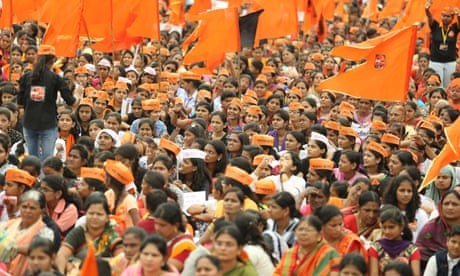Description

Disclaimer: Copyright infringement not intended.
Context
- The Bharatiya Janata Party (BJP) filed a complaint against Rahul Gandhi for remarks on 'shakti' that allegedly hurt Hindu sentiments, while the Dravida Munnetra Kazhagam (DMK) filed a counter-complaint against the Prime Minister for appealing to religious sentiments on the same issue.
Legal Provisions:
Representation of the People Act, 1951 (RP Act):
- Section 123(3) prohibits appeals by candidates, or with their consent, to vote or refrain from voting based on religion, race, caste, community, or language.
- Section 123(3A) denounces attempts by candidates to promote enmity or hatred among citizens on these grounds during elections.
- Violation of these provisions constitutes corrupt electoral practices and can result in debarring from contesting elections for up to six years.
Model Code of Conduct (MCC):
Guiding Principles:
- The MCC, evolved with political parties' consensus, binds them to uphold principles of mutual respect and non-aggravation of existing differences.
- Prohibits any activity that may exacerbate communal tensions or appeal to caste or communal feelings for securing votes.
- Specifically prohibits the use of places of worship for election propaganda.
- Despite lacking statutory backing, the MCC has been rigorously enforced by the Election Commission of India (ECI) over the past three decades.

Historical Evolution:
Amendments to RP Act:
- Amendment in 1961 removed the requirement for a "systemic" appeal on grounds of religion, race, caste, or community to be considered a corrupt electoral practice.
- Resulted in any appeal, even a stray one, for electoral success based on religious or communal affiliations being viewed unfavorably by the law.
Enforcement and Precedents:
Enforcement by ECI:
- Several cases registered under RP Act and Indian Penal Code against leaders for appealing for votes on religious grounds.
- Bal Thackeray of Shiv Sena notably convicted by Supreme Court in 1995.
- ECI typically bars violators from campaigning for short periods but lacks robust punitive measures.
Judicial Interpretations:
Supreme Court Rulings:
- Abhiram Singh vs. C. D. Commachen (2017) expanded the scope of Section 123(3) to include appeals for votes not only based on a candidate's religion but also that of the voters.
- Upheld the secular nature of elections, emphasizing that religion should remain a personal matter and not influence electoral processes.
Path Forward: Upholding Secularism and Legal Compliance
Addressing Legitimate Concerns:
Policy Formulation:
- Political parties and candidates may address citizens' concerns of religious, caste, or community origin through appropriate policies.
- Emphasis on resolving grievances without compromising the secular fabric and fraternity of the nation.
Mitigating Religious Influence:
Avoiding Mixing of Politics and Religion:
- Political leaders should refrain from campaigning on religious grounds to prevent further polarization in a multi-religious society.
- Use of places of worship for electoral canvassing should be discouraged to maintain the sanctity of religious institutions.

Strengthening Enforcement Mechanisms:
Swift Action against Violators:
- Election Commission and courts need to devise expedited mechanisms for penalizing those violating laws against religious appeals in elections.
- Swift and decisive action required to deter future violations and uphold the integrity of the electoral process.
Conclusion:
- Efforts to ensure secularism in electoral politics are imperative for preserving the democratic principles of equality and fraternity.
- While legal provisions and judicial rulings provide a framework, effective enforcement and adherence by political stakeholders are essential.
- Upholding secularism not only safeguards the integrity of the electoral process but also fosters social harmony and cohesion in a diverse nation like India.
|
PRELIMS QUESTION
Q. Discuss the importance of initiatives aimed at enhancing inclusivity in voting. Highlight key measures, challenges, and their impact on promoting a more representative democracy. Offer suggestions for further improvement in inclusivity.
|















